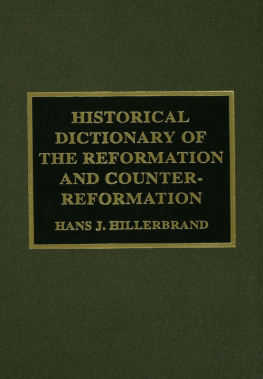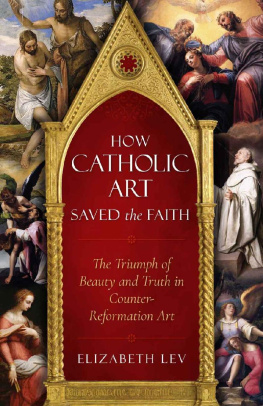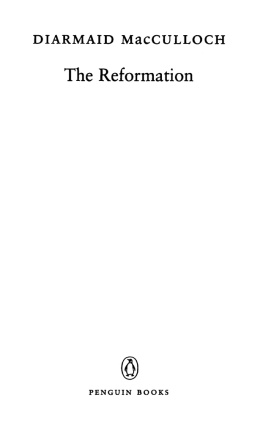Hillerbrand Hans J. - Historical Dictionary of the Reformation and Counter-Reformation
Here you can read online Hillerbrand Hans J. - Historical Dictionary of the Reformation and Counter-Reformation full text of the book (entire story) in english for free. Download pdf and epub, get meaning, cover and reviews about this ebook. publisher: Taylor & Francis Group, genre: Religion. Description of the work, (preface) as well as reviews are available. Best literature library LitArk.com created for fans of good reading and offers a wide selection of genres:
Romance novel
Science fiction
Adventure
Detective
Science
History
Home and family
Prose
Art
Politics
Computer
Non-fiction
Religion
Business
Children
Humor
Choose a favorite category and find really read worthwhile books. Enjoy immersion in the world of imagination, feel the emotions of the characters or learn something new for yourself, make an fascinating discovery.
- Book:Historical Dictionary of the Reformation and Counter-Reformation
- Author:
- Publisher:Taylor & Francis Group
- Genre:
- Rating:5 / 5
- Favourites:Add to favourites
- Your mark:
- 100
- 1
- 2
- 3
- 4
- 5
Historical Dictionary of the Reformation and Counter-Reformation: summary, description and annotation
We offer to read an annotation, description, summary or preface (depends on what the author of the book "Historical Dictionary of the Reformation and Counter-Reformation" wrote himself). If you haven't found the necessary information about the book — write in the comments, we will try to find it.
Historical Dictionary of the Reformation and Counter-Reformation — read online for free the complete book (whole text) full work
Below is the text of the book, divided by pages. System saving the place of the last page read, allows you to conveniently read the book "Historical Dictionary of the Reformation and Counter-Reformation" online for free, without having to search again every time where you left off. Put a bookmark, and you can go to the page where you finished reading at any time.
Font size:
Interval:
Bookmark:
of the Reformation
and Counter-Reformation

FITZROY DEARBORN PUBLISHERS
FITZROY DEARBORN PUBLISHERS
919 N. Michigan Avenue
Chicago, IL 60611
or
FITZROY DEARBORN PUBLISHERS
310 Regent Street
London W1R 5AJ
England
Copyright 2000 by Hans J. Hillerbrand
All rights reserved. No part of this publication may be reproduced, stored in a retrieval system, or transmitted in any form or by any means, electronic, mechanical, photocopying, recording, or otherwise, without the prior permission of the publisher.
British Library and Library of Congress Cataloguing-in-Publication Data are Available
ISBN 1-57958-205-2
First published in the USA and UK 2000
For more information about Fitzroy Dearborn Publishers,
see www.fitzroydearborn.com
 The paper used in this publication meets the minimum requirements of American National Standard for Information SciencesPermanence of Paper for Printed Library Materials, ANSI/NISO Z39.481992. Manufactured in the United States of America.
The paper used in this publication meets the minimum requirements of American National Standard for Information SciencesPermanence of Paper for Printed Library Materials, ANSI/NISO Z39.481992. Manufactured in the United States of America.
, by Jon Woronoff
No matter how much you may relativize, the Reformation was still one of the most dramatic turning points in world history. It propelled countless millions of people toward other directions than they had been following, and even those who continued along the same path at least knew there were alternatives. Otherwise there would have been little need for a Counter-Reformation. These momentous movements concerned not only the people of that time but successive generations as well, usually with less fervor, but with a growing conviction that the new directions were right and natural. Moreover, while the events occurred in Europe, they had an impact on most other parts of the world to some extent. It is hard to come up with many other turning points that affected as many, as much, for as long.
This explains the abiding interest in the Reformation (and Counter-Reformation) and the usefulness of another reference work on the subject. This historical dictionary, while smaller, has the advantage of covering the ground not once but four times, each from a different perspective. The introduction provides a broad historical overview. The dictionary entries present in some detail the crucial persons, places, events, documents, and concepts. The chronology traces the historical progression. The bibliography provides access to a continually renewed literature, delving into many subjects from many vantage points. Because this book was written by one person, it was easier to achieve a balance in the choice of entries and work the various parts into a cohesive whole.
One could hardly imagine a better author for this Historical Dictionary of the Reformation and Counter-Reformation than Hans J. Hillerbrand. After receiving his doctorate in Germany, where he occasionally returned as visiting professor, Dr. Hillerbrand spent most of his career in the United States, most recently as chairman of the Department of Religion at Duke University. For over four decades, he has studied, lectured and written about the Reformation. His publications include several dozen articles and a dozen books as well as the editorship of The Oxford Encyclopedia of the Reformation, the most substantial work on the subject. During this period, Dr. Hillerbrand has been a member (and president) of the American Society for Reformation Research as well as president of the American Society for Church History and long-standing vice chairman of the Center for Reformation Research. As stated, one could hardly imagine a better author.
Jon Woronoff
Series Editor
The invitation, three years ago, to write a dictionary of the Reformation and Counter-Reformation provided me with the welcome opportunity to do some careful reflection on what was, and what was not, important in the 16th century. Moreover, the invitation challenged me to augment my own competence and conversance in areas in which I felt less at home than in others. The work on the dictionary thus came to be an informative seminar experience and an immense learning process.
I should record my sentiment that the field of Reformation and Counter-Reformation studies (to use these two traditional terms rather than the substitutes, such as Early Modern Europe or Catholic Reform, that have been proposed) certainly is alive and well. Several journals focus, in one way or another, on the period, and the number of articles and monographs published each year staggers the imagination. Of course, not all was worth publishing, at least from my perspective, but a great deal of what is published assuredly is propelling the scholarly discourse forward and providing new insights. I trust that this dictionary reflects the fact that I have learned a great deal from these publications.
As regards the larger picture of Reformation and Counter-Reformation studies I confess to some uncertainty. The field of historical studies is at present undergoing a paradigm shift in which the traditional dominance of European history is challenged in a number of ways. A number of scholars are arguing that to talk about an age or a period of the Reformation distorts the broad and important lines of continuity which connect the entire period from the late 14th to the late 17th century. Accordingly, the Reformation is deprived of its distinctiveness. Other scholars find it appropriate to speak of Reformations of the 16th century. These developmentsby no means convincing to memay well effect the future course of scholarship. Whether the field of Reformation studies will be able to retain the important place it had in the past seems to me an altogether open question. Of course, historians are not prophets. And there is no doubt that the period of the Reformation and Counter-Reformation continues to offer excitement and deep insights to those who study it.
I am pleased to acknowledge the welcome help I received from Dr. Karin Brown, who contributed a number of articles to this dictionary. Dr. Brown received her Ph.D. from the City University of New York and has taught at Hunter College. She is the author of Karl Lueger, the Liberal Years: Democracy, Municipal Reform, and the Struggle for Power in the Vienna City Council, 18751882 (New York, 1987). She also contributed more than a dozen articles to the Oxford Encyclopedia of the Reformation (New York, 1997).
Hans J. Hillerbrand
Duke University
The Reformation of the 16th century used to be seen as one of the pivotal events in European history. Lord Acton, the famous 19th-century British historian, compared the importance of Martin Luther's speech at the diet at Worms in 1521 with Napoleon's defeat at the Battle of Waterloo in 1815, surely a rather extravagant claim. But the 19th century also was the time when the ideas and ideals of the Protestant Reformation were seen as harbingers of modernity, and those disposed to a religious perspective saw the Reformation as the most authentic interpretation of Christianity since the days of the apostolic age. This exuberant perspective was discounted, of course, by Catholic historians whose notion was the diametrically reversed insistence that Protestantism had destroyed a flourishing religious culture. Late medieval Christianity was seen as having a splendid vitality and piety, only to be torn apart by the Protestant Reformation.
Font size:
Interval:
Bookmark:
Similar books «Historical Dictionary of the Reformation and Counter-Reformation»
Look at similar books to Historical Dictionary of the Reformation and Counter-Reformation. We have selected literature similar in name and meaning in the hope of providing readers with more options to find new, interesting, not yet read works.
Discussion, reviews of the book Historical Dictionary of the Reformation and Counter-Reformation and just readers' own opinions. Leave your comments, write what you think about the work, its meaning or the main characters. Specify what exactly you liked and what you didn't like, and why you think so.






